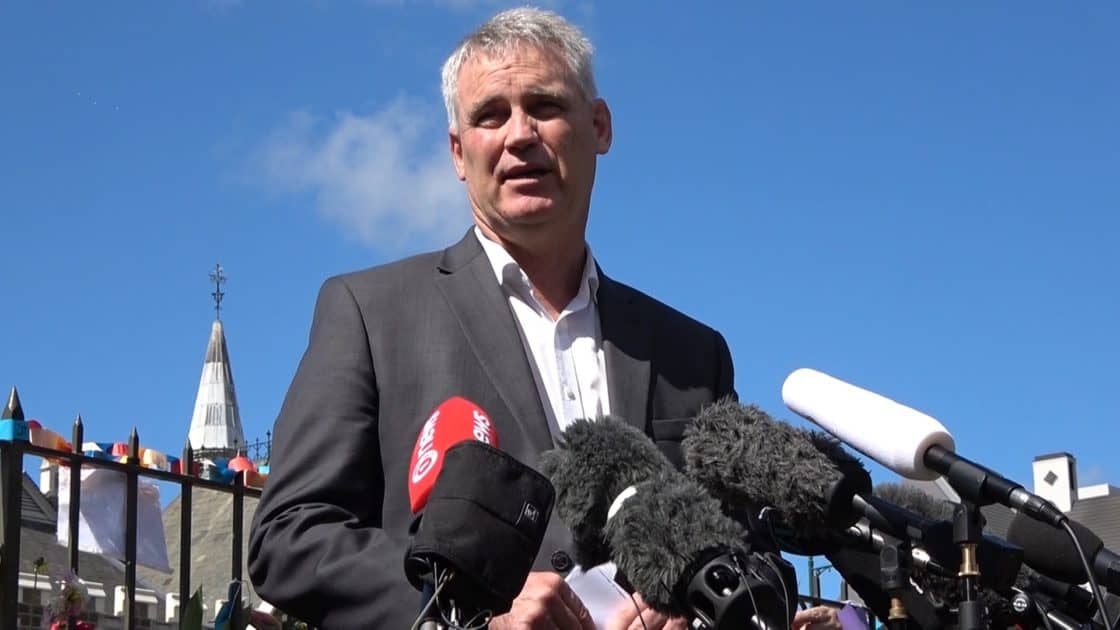Tuesday 19 March 2019Media release4 minutes to read
THIS IS AN ARCHIVED PAGE. The advice and information contained in this page may not be current and it should only be used for historical reference purposes.

Canterbury DHB Chief Executive, David Meates addressing media today to give an update on the patients in the DHB's care
Please attribute comment to David Meates, Chief Executive, Canterbury District Health Board
30 patients who were injured in the mosque attacks are still in Christchurch Hospital. One further person was well enough to go home today and is being supported by family and friends. The Canterbury Health System provides wrap around care for people returning to the community after a hospital stay.
There are still 9 people in a critical condition in intensive care. A 4 year old girl is still in a critical condition in Starship Hospital in Auckland. Her father is near her in Auckland City Hospital and his condition has improved so that he is no longer considered serious, and is now stable.
People injured in the mosque attacks are still our priority for surgery and other specialist care but we are also planning ongoing wellbeing and other support for them and their families, for the Muslim community in particular and for the wider community.
As yesterday and over the weekend, we are gearing all available theatres to follow-up acute surgery, which means we will be continuing to postpone planned surgeries for some time to come in order to free up theatre space and surgical teams. We apologise to anyone who may have their surgery postponed, but know they will understand the extraordinary circumstances.
Christchurch Hospital is busier than ever, but with many services operating as normally as possible. Most appointments at Christchurch Outpatients are going ahead as planned. If your appointment has to be postponed, we will contact you directly. We are prioritising the time of the clinicians needed to care for those injured in last Friday’s attack.
As the events of the past few days sink in, it’s important we continue to support one another and look out for those we love more than ever. It is likely that many of us may continue to be on edge and upset periodically for some time to come. This is perfectly normal, and we need to be generous with one another and forgiving, and patient if someone is snappy, emotional or not their usual self.
This advice comes from the Mental Health Foundation and the All right? team. Their messages are based on best-practice wellbeing promotion evidence, and apply to all situations where people are struggling.
There are small things we can do to look after ourselves and others, even when times are tough.
- Be kind to one another. Kindness is contagious, and boosts endorphins (feel-good hormones) for both the giver and the receiver
- Take a digital detox, and focus on an activity you love. Reading, games with the kids, or a short walk – getting out into nature is very healing.
- Spend time with people you love – we all need each other. Talk about how you’re feeling, and take the time to listen to others who want to talk
- Focus on the things you can control.
Supporting our kids and whānau
- Children take their cues from parents — so if you’re okay, they’ll be okay too
- Be mindful how much ‘worry’ you’re displaying, be as cool as you can!
- Keep children away from more sensational media reports about the Christchurch shootings, but share things that are about the love people show such as the wall of flowers
- Answer their questions pretty matter-of-factly and in very ‘general’ terms. You don’t have to get the answers exactly right here. Ensure you talk too about the great job the Police do in keeping us safe.
Keep the reassurance low key too — over-reassuring can make us think we need to be worrying more than we are!
- Let them talk about it, but don’t let it ‘take over’ – use distraction to keep their mind off it
- Stick to your normal routines as much as you can.
If you want to talk to a trained counsellor, you can phone or text 1737 to be put through to a counsellor any time of the day or night. This is a free service for everyone.

Back to Health News


